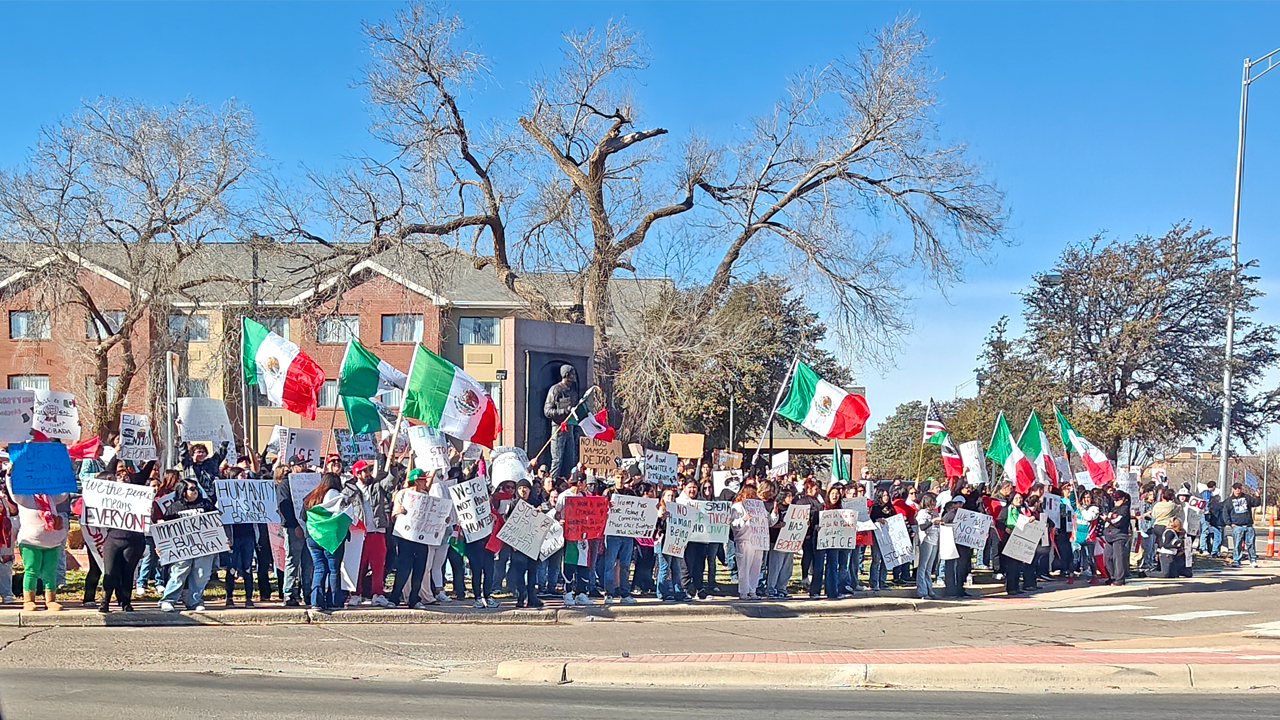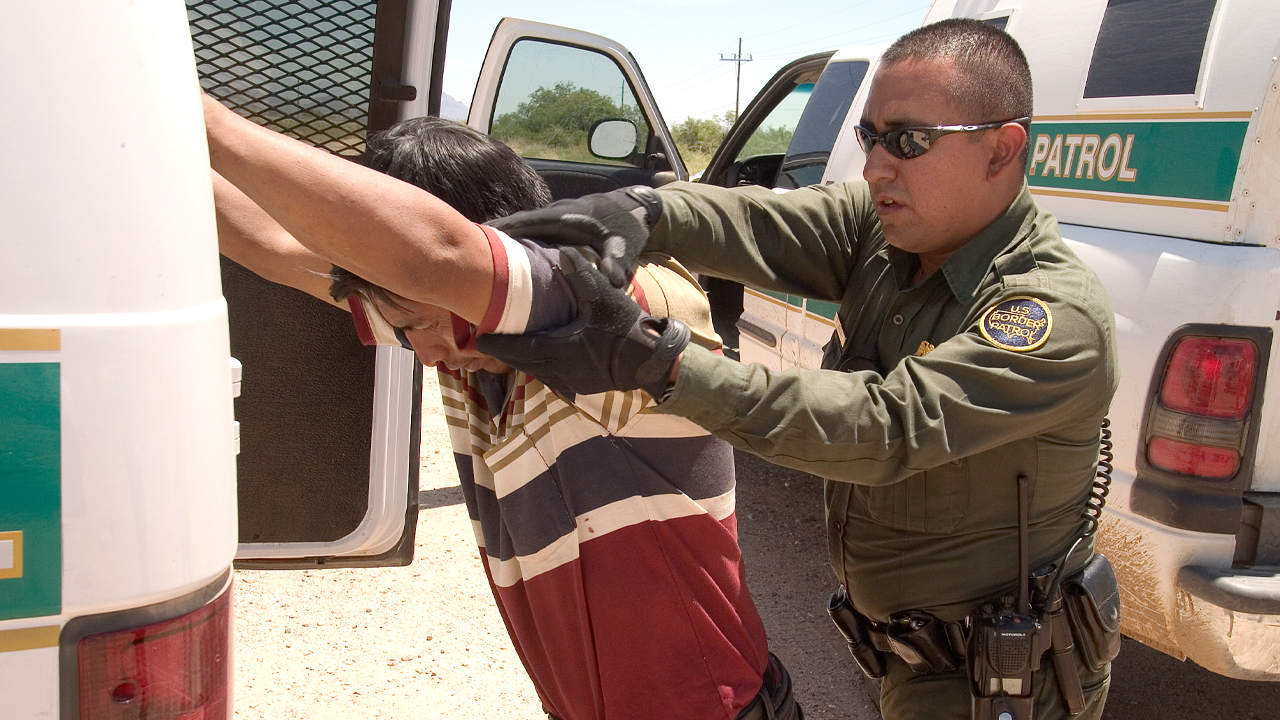An undated photo from cbp.gov
The federal government’s tougher stance on immigration since President Trump returned to power is causing ripples in Lubbock County.
- A small number of Lubbock residents living here illegally have kept their kids out of Lubbock schools.
- From January 20 through February 10, the Lubbock County Sheriff’s Department has received 45 immigration detainers from the U.S. Immigration and Customs Enforcement (ICE), asking the department to “notify ICE as early as possible before a removable alien is released from their custody,” according to an ICE spokesperson.
- Rob Hogan, a Lubbock attorney who works on immigration cases, said he’s heard ICE is focused on construction sites, not schools. “There has been a monumental shift here in Lubbock. I know that ICE has increased the tempo of their operations here. They’re doing more raids. … They’re visiting more workplaces. They are detaining and arresting more people,” he said.
There’s also conflicting information:
- A January 21 announcement by the U.S. Department of Homeland Security said federal agents would no longer avoid churches or schools when enforcing immigration laws. Alice ISD near Corpus Christi sent a letter to parents about extracurricular activities saying, “agents may be boarding school buses … to question students about their citizenship status.”
- But a U.S. Border Patrol RGV Sector Facebook post Feb. 7 said: “Misinformation is spreading that U.S. Border Patrol agents are conducting immigration inspections are schools, churches, hospitals and more recently targeting students at immigration checkpoints. This is completely FALSE.”
- A staff member with Congressman Jodey Arrington’s office told LubbockLights.com the government’s focus is to arrest and deport “criminal aliens,” and there is no policy targeting schools.
Hogan also would like to see the federal government offer amnesty for residents living here illegally and revitalize the guest worker program, which Lubbock’s Congressman Jodey Arrington opposes.
Arrington – U.S. House budget chairman – announced three resolutions the day after Trump took office to: “Block implementation of harmful regulations at the Department of Homeland Security that dilute American wages, put the American worker last and serve as a magnet for illegal immigration into the U.S.”
Lala Chavez fights back
Lala Chavez, Lubbock ISD trustee for District 1, is working as part school board member, part activist against the immigration crackdown. She’s using her Facebook page as a resource guide for people to:
- Know their rights.
- Tips on how to avoid getting pulled over while driving.
- Needed documents.
- Tips on how to deal with ICE, including outlining what she said were deceptive practices.
Chavez participated in a February 2 protest at 50th Street and Interstate 27.
It was organized and held separately from another protest, the day before, at the Tim Cole statue at 19th Street and University Avenue. Participants held signs with messages like, “Love has no borders” and “Stop ripping families apart.”

(A January New York Times poll said 55 of Americans strongly or somewhat support mass deportations.)
She’s seen two things happen – kids not going to school and parents staying home and not driving.
Fourteen kids were absent from Monterey High School on the last Friday of January, Chavez told LubbockLights.com. Monterey has more than 2,000 students, but it’s not known how many of them are not living here legally. She didn’t know the numbers for Lubbock High or Estacado but said Monterey was the highest.
“Their parents were afraid to take them,” Chavez said.
Chavez helped promote a recent meeting downtown between attorneys and families with kids at Harwell Elementary School.
“They encourage them not to drive if they’re not documented, because if you make a wrong mistake, you don’t have your blinker on and they decide to pull you over for whatever reason, they’re gonna ask you for your driver’s license,” Chavez said.
Once that happens, an arrest and deportation is possible, Chavez said.
Volunteers organized a carpool and Chavez continued telling parents the kids must go to school or risk truancy. Chavez tried to calm the fear with a series of public statements.
On Facebook, she said, “I want to assure you that district leadership, including Chief [Eric] Tijerina, has been in communication with Homeland Security. We have been informed that ICE will not enter our schools.”
Chavez praised Tijerina.
“He’s phenomenal with the community, and he went out and had a meeting with Homeland Security that particular day before I did this statement and they assured him that if any ICE goes up to the any school door for them not to answer; to call the chief,” she said.
Chavez released a copy of the LISD’s policy for law enforcement. The policy does not stop Immigration and Customs Enforcement (ICE) officers, but it calls for staffers to verify certain things before a student is questioned or detained. (See the policy below.)
“I wanted to try to put their mind – their heart, at ease that we as a district can do everything possible to make them be at peace. … There’s a protocol that’s in place and I wanted to reassure them of that,” Chavez said.
“If anything, I can see the numbers declining in enrollment in the district if it continues to be a problem,” Chavez said.
Lubbock ISD administration declined a chance to talk about this story, as did Frenship and Lubbock-Cooper ISDs.
Lubbock ISD policy shared online by Lala Chavez
When law enforcement officers or other lawful authorities request to question or interview a student at school for any purpose other than a child abuse investigation, the following guidelines shall apply:
1. The principal shall verify and record the identity of the officer or other authority and request an explanation of the need to question or interview the student at school.
2. The principal ordinarily shall make reasonable efforts to notify the student’s parent or other person having lawful control of the student. If the interviewer raises what the principal considers to be a valid objection to the notification, the parent shall not be notified.
3. The principal or a designee ordinarily shall be present during the questioning or interview. If the interviewer raises what the principal considers to be a valid objection to a third party’s presence, the interview shall be conducted without that person’s presence.
Source: Lala Chavez on Facebook.
Arrington: ‘Restore rule of law’
Arrington also introduced the America First Act with Texas Congressman Chip Roy, who represents parts of San Antonio, Austin and the Hill Country.
It was described as an effort “to prevent illegal immigrants paroled into the United States from accessing billions of dollars in welfare and other benefits intended for American families.”
The bill remains pending in several House committees.
The aforementioned resolutions Arrington announced Jan. 21 would reverse a recent expansion of work visas. They would also eliminate last year’s expansion of temporary work permits which had gone from 180 days to 540.
“I’m proud to lead the fight to reverse ridiculous DHS rules that prioritize illegal immigrants over American workers, and I look forward to working with President Trump to restore rule of law and put the safety of the American people first,” said an Arrington press release.
Hogan advocates changes, not politically popular
Hogan is not convinced the current level of enforcement can continue financially.
“I would not be surprised if it is 20 to 25 million people. … If you’re talking about an effort to deport 25 million people, how do you do that? That’s like evacuating the entire population of Florida,” Hogan said.
“Where do you put them all? … The cost is going to quickly rise to a level where it’s not sustainable anymore. And by that point, they’ve gotten the publicity they wanted, and they’ll slack off in that effort. The focus will shift to something else,” Hogan said.
But that doesn’t solve anything, Hogan said. Immigration cases are coming into the court system ten times faster than judges can clear them, he said, based on his conversations with officials in the court system.
If someone does not want to accept voluntary removal from the United States, the case needs to proceed to a final hearing.
“The final hearings they’re setting are in 2029,” Hogan said.
Often (not always) for Mexican citizens, but not other countries, there is a fast-track system to deport people.
“They will put them on a bus. They’ll take them down to El Paso to Montana Avenue to the International Bridge, open up the bus door and tell them to start walking south. They walk across the international bridge and on the other side, that’s the first time they have the opportunity to use a phone to call back to the US – to their family,” Hogan said.
How often does that happen in Lubbock?
“Daily. That’s a frequent thing. I get calls on a regular basis from family members who learn about their loved ones’ deportation only after the fact,” Hogan said, although it’s been going for years and is not new since Trump took office.
If someone is deported to Mexico on a fast-track, there are no options for family members back here in Lubbock, Hogan said.
“The answer is no. At that point, there’s nothing that you can do. They can go back through the regular process to try to come into the country, but if you have been deported or accepted voluntary departure, it’s really hard to get permission to come back the right way,” Hogan said.
Hogan thinks the solution – which needs to come from Washington, not Lubbock – includes a lot more immigration judges.
The Council on Foreign Relations said, “[The Trump] administration managed to halt most foreign worker visa programs during the COVID-19 pandemic. President Joe Biden has sought to reverse his predecessor’s approach by expanding the legal opportunities for temporary migration, but reform efforts have also faced resistance from some policymakers.”
Workers feel like they cannot leave because there is no way to get back into the country legally, Hogan said.
And he’s also in favor of amnesty and revitalizing the guest worker program, which are not going to happen anytime soon.
“They need to have a lot simpler path for people to go through. And for the people that are in this country, I think that they need to have some sort of amnesty process. … Nobody wants to talk about amnesty,” Hogan said.
Correction: An earlier version of this story incorrectly identified which protest Lala Chavez participated in.
Please click here to support Lubbock Lights.
Comment, react or share on our Facebook post.


 Facebook
Facebook